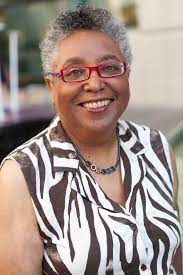In the United States, the privileged will always find ways to get the reproductive health care they need and be able to make the choices they want. That’s not always the case for Black folks, queer folks and other vulnerable populations.
While the fight for reproductive justice has become more urgent than ever in the wake of the Dobbs decision, it can feel like the conversation is dominated by just two voices: conservative Christians on one side and secular liberals on the other.
An intersectional, faith-based, and sometimes provocative counterpoint to that binary was on display at a recent Pacific School of Religion event, Reproductive Justice and Queer Black Bodies, part of the Center for LGBTQ and Gender Studies in Religion (CLGS)’s Lavender Lunch series. The Lavender Lunch, held on Oct. 11th, featured Dr. Sylvia Rhue, the Faith, Education and Outreach Coordinator at SisterReach, in conversation with Rev. Dr. Roland Stringfellow, Senior Pastor at Metropolitan Community Church of Detroit and coordinator for CLGS’s African American Roundtable.
Dr. Rhue began the conversation by offering a history lesson on the term ‘reproductive justice.’ Though it may seem new, the framework was coined almost 30 years ago by 12 Black women and designed to center the lived experiences of Black women. She stressed that reproductive justice isn’t just about the ability to end a pregnancy and access birth control. It addresses a range of issues that keep people from achieving reproductive and sexual autonomy, including the rights to bodily autonomy, and to decide if, when and how to have a baby, the ability to support and safely raise children who are already here, and the freedom to express sexuality and spirituality without shame or violence.
Because of its roots and its goal to emancipate vulnerable populations, Rhue said the message of reproductive justice should resonate with the Black community. Unfortunately, she said, it sometimes meets resistance, especially in the Black church, which she said she often thinks of as having AIDS. Not Acquired Immune Deficiency Syndrome, but “Absolutely Ignorant about the Divinity of Sex.”
Sex and sexuality are far from incompatible with Christianity according to Rhue. “I‘ve spent years, I mean a lot of years working with Black clergy and congregants, convincing, or reminding them that it was actually God who gave us the gift of sex and sexuality, and every single part of the human body. Our brains our hearts, our eyes, our hands, bones, muscles, organs, senses, and genitals are part of God’s plan for the expression and existence of life.”
“You know, it’s not like God created humans and took a coffee break, and then the devil snuck in and put in the genitals,” she quipped.
Rhue sees many points of intersection between reproductive justice and LGBTQ+ rights because both fight for basic human rights or, “equal justice for equal souls.” For churches to be healthy, she said, it’s vital that they have adults in authority who are knowledgeable about human sexuality and can talk to youth in a sex-positive way that embraces both sexual desire and sexual orientation.
When asked how she responds to people in the church who believe God is anti-abortion, Rhue first quoted the evangelical minister John Pavlovitz’s essay, God is Pro-Choice: “The idea that America is here at this place and time in our planet’s history, still debating whether or not women should have autonomy over their own bodies, shows we aren’t maturing or progressing or evolving as a nation.”
“If you believe that God exists, and if you believe the Christian Scriptures to be your primary guide in understanding the character of that God—you find out pretty early on that free will is kind of a big deal.”
Rhue added that the argument shouldn’t be about the semantics of pro-choice and pro-life or about when life begins or even abortion at all but if God has given women free will. “Any supposed believer who claims the Bible directs them arguing against the woman’s right to choose is arguing against the very heart of God as depicted in the Scriptures.”
Rhue closed by emphasizing what she sees as the most important mission she has at SisterReach — to take care of the humans that are here now. To help them live life abundantly, with human dignity and bodily autonomy.
_________________________
 Dr. Sylvia Rhue is Faith, Education and Outreach Coordinator at SisterReach, a Memphis-based grassroots non-profit organization that supports the reproductive autonomy of women and teens of color, poor and rural women, LGBT+ and GNC folx, and their families through the framework of Reproductive Justice.
Dr. Sylvia Rhue is Faith, Education and Outreach Coordinator at SisterReach, a Memphis-based grassroots non-profit organization that supports the reproductive autonomy of women and teens of color, poor and rural women, LGBT+ and GNC folx, and their families through the framework of Reproductive Justice.
A co-founder of The Black Gay and Lesbian Leadership Forum, Dr. Rhue co-produced and co-directed (with Oscar-nominated directors Frances Reid and Dee Mosbacher) the 1996 documentary All God’s Children, which dealt with African American family and religious values, civil rights, and homophobia. This film won several awards, including Best Documentary at the National Black Arts Film Festival, and a Lambda Liberty Award from the Lambda Legal Defense and Education Fund. Other films produced by Dr. Rhue include Women in Love, We Have a Legacy, and Women and Children: AIDS and HIV.
Dr. Rhue also served with the National Black Justice Coalition from its founding in 2003, as a board member and a director. She also spoke out against condemnation of the LGBT community by the religious right, declaring once that “Love is the engine of the universe and cannot be boiled down to tab A goes into Slot B.” In 2006, she helped to organize the Black Church Summit in Atlanta, to promote acceptance of gays and lesbians in Black churches. Dr. Rhue has also worked for the Religious Coalition for Reproductive Rights and as Director of Equal Partners in Faith. She has also authored many articles, including contributions to The Huffington Post and other publications.
Learn more about the work of SisterReach, get resources, and get involved: sisterreach.org
